
NISAR THOKAR
Islamabad, Mar 11: Khursheed Hasan Khursheed, the man who was groomed under the leadership of Qaid-e-Azam Muhammad Ali Jinnah, had the honour to be part of the movement that culminated in the shape of Pakistan. He is the first Kashmiri who came across the events that took place during the Pakistan movement. The gentleman had the privilege to be the private secretary of Pakistan’s founding father. Born in a modest middle-class family of Srinagar in 1924, Khursheed received early education from his hometown and completed Bachelors Degree from Amar Singh College Srinagar. It was the time when entire Indian subcontinent was on the verge of war against British imperialism, demanding Britain to quit the subcontinent. Revolutionary by nature, young Khursheed during his college life established Kashmir Muslim Students’ Federation to educate people particularly the youth about the mass uprising against British rulers. The existing upheaval in the region was one of the basic reasons that led K H Khursheed to join All India Muslim League. In 1942, being general secretary of the federation he and his accomplice, Ghulam Rasool, were chosen to go and see the Qaid in Jalandhar, where Jinnah handed over a flag of the party to him. And when Qaid-e-Azam visited Kashmir along with his sister Fatimah Jinnah, Khursheed was working with Orient Press of India and as a representative of the press he met the visiting leader in Srinagar. Khursheed had been frequently visiting the residence where Jinnah was staying. This regular interaction between the two culminated with an atmosphere of trust and understanding. In May 1944, Jinnah asked Khursheed if he would be willing to help Lobo, the Personal Assistant of Qaid-e-Azam, in translating news items from Urdu into English. Khursheed accepted the offer wholeheartedly and started preparing daily summaries for the Qaid. One day Jinnah called Khursheed and while appreciating his translation work asked, “Would you like to work for us? You don’t have to answer just now, think over it and let me know,” Qaid said.Khursheed was surprised to hear the offer, he went straight away to consult his father Moulvi Muhammad Hasan who was a teacher. After consultations, Khursheed finally decided to join the services of the great leader. This was a turning point of his life and at that very moment he had not even an inkling that he would play such a fabulous role in reshaping the destiny of Muslims of the subcontinent under the leadership of Qaid-e-Azam. And spending a few years with Jinnah completely changed the course of his life. Although young, he achieved political maturity learning from the Qaid integrity, strong will and faith in the inevitability of the objectives. Khursheed was a young graduate, hardly 20 years old when he was picked up by the Qaid for such a sensitive job. Khursheed accompanied the Qaid on his tour to Bombay, Punjab and even in 1946 he was along with Qaid when he visited London where Khursheed accompanied Pakistan’s founding father during several meetings with British leaders including Winston Churchill. The commitment, dedication and untiring zeal of this Kashmiri youth impressed the great leader of Pakistan. He is believed to have said that Pakistan was made by him, his secretary and his stenographer. The secretary about whom he had referred to was K H Khursheed. As the private secretary of the towering leader, Khursheed worked passionately. It was a matter of great satisfaction for him that Qaid loved him and treated him as more than his personal secretary. After the birth of Pakistan, Khursheed escorted the Qaid to Karachi. Having been engaged in hectic political activities for several years he had not seen his parents and therefore with the permission of the Qaid he left for Kashmir to meet his family members and to carry out certain tasks given to him. As he entered the valley he was arrested and put behind the bars for many years. He heard the shocking news about the death of Muhammad Ali Jinnah while in prison in Srinagar.Jinnah was highly concerned over the incarceration of his secretary and therefore wrote a letter to then Indian PM, asking him to felicitate the release of Khursheed. In exchange for an Indian General, Ghansara Singh, he was finally released in 1949. Shocked by the death of his leader, Khursheed quit politics straight away and decided to launch a weekly magazine. Joining hands with Aziz Beg, a veteran journalist whom he had known while in Bombay, he started “Weekly Guardian” with its office in Lahore. Due to some reasons the magazine did not go well and he finally went to Karachi where he resumed his work with Fatima Jinnah. Miss Jinnah was very affectionate to him and it was she who persuaded him to become a Barrister. Inspired by the great leader, he too joined Lincolns’ inn and after completing his degree he returned to Pakistan in 1954. The Former Prime Minister of Pakistan Zulfiqar Ali Bhutto and Margaret Thatcher, the ex-Prime Minister of Britain were amongst his contemporaries.In 1955 Khursheed got married with his cousin Sorraya, the daughter of Noor Hussain. In 1956 he was appointed as the Foreign Publicity Advisor by the government of Azad Jammu and Kashmir. In 1959, Khursheed was appointed as president of Pakistani administered Kashmir. During his tenure as the president of PaK, he established his own political party, Jammu Kashmir Liberation League. In 1964, after quitting the presidency, K H Khursheed started his political activities from the same platform. Besides projecting Kashmir cause he continued his struggle to strengthen democratic values. In the meantime, Khursheed and his wife Suraya shifted to Karachi where they alongside Miss Jinnah stayed for a couple of years in Flag Staff House.In 1965, when Miss Jinnah decided to contest elections against Field Marshal Ayoub Khan, Khursheed as the key campaigner spearheaded the election campaign. Following the death of Miss Jinnah in 1967, Khursheed besides engaged in politics started practicing law in Lahore High Court.Khursheed participated in the parliamentary elections in 1970 and 1985. He was an honest, upright and a matured politician. He had the honour to be the first elected president of Azad Jammu and Kashmir.He was the man who gave the right of vote to the people of Pakistani administered Kashmir and the Kashmiri refugees settled in Pakistan and established first ever Legislative Council, which was later on converted to Azad Jammu and Kashmir Legislative Assembly. He also constituted the Public Service Commission, Development Board and introduced Land Reforms in the territory thereby putting an end to feudalism. He was a visionary who could see the future on account of his wisdom that is why he suggested a visionary political solution to Kashmir problem that still stands true and viable.Introducing a vibrant Kashmir policy for achieving the collective cause of the people of Jammu and Kashmir, Khursheed proposed that the people of Jammu and Kashmir should be fully authorised to project the cause of freedom by endorsing the all inclusive government of AJK including Gilgit and Baltistan at international level so as to garner support of the peace loving nations across the globe.He never exploited his political stature for material ends. He was a straight forward person and real democrat who fought for the rights of the people and was never afraid of the rulers no matter how powerful they were.When he died he was living in a rented house. He died on 11th March 1988 in a road accident while traveling in a public van from Gujrat (Pakistan) to Lahore.[Greater Kashmir]
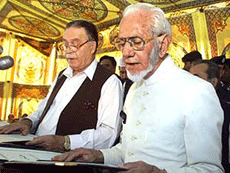
Sardar Muhammad Ibrahim Khan was the first President of Azad Kashmir (the area of Kashmir which is administered by Pakistan). Khan was also the President of the All-Jammu and Kashmir Muslim Conference. He was born in 1915 in the Poonch District of Kashmir.He went to Poonch High School and, in 1936, to Islamia College, Lahore (then a part of British India). After graduation he studied law in Britain. In 1943 he obtained the LLB from the University of London.After the independence of Pakistan from Britain, Khan became the special representative of Kashmir to the United Nations.He was elected President of Azad Kashmir on five separate occasions. Sardar Ibrahim Khan is member of the Sudhan tribe of Kashmir. He died during 2003 at his son’s home in Islamabad Pakistan.
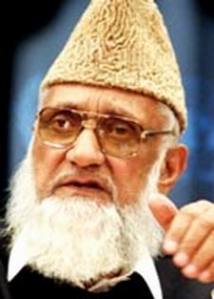
Heart to Heart’with Sardar Muhammad Abdul Qayyum Khan
Ashima Kaul
——————————————————————————–
Sardar Muhammad Abdul Qayyum Khan, former Prime Minister of Azad Kashmir (Pakistan-Administered Jammu and Kashmir) and Supreme Head of All J & K Muslim Conference was in New Delhi to participate in “Intra J & K ‘Heart to Heart Meet” held on 20th and 21st of September 2005 and organized by the Indian Council of World Affairs and the Coordination Committee of J&K Leaders and Intellectuals. In this interview with Ashima Kaul he speaks about the Kashmir conflict and the possibilities of resolving it.
Question: Is this your first visit to India? What were your thoughts before coming?
Yes this is my first visit to Independent India. I last came here in 1946. It has been sixty years. I see a lot of development and that is understandable. However I do not find any difference in the essence of India. It is the same and I am very comfortable here. There was no specific agenda other than the ‘Heart to Heart’ talk with Kashmiris from the other side (of Kashmir). I had no idea as to who all were coming for the interaction. I myself was in doubt whether I would be able to visit Delhi or not. But here I am, and by and large it was a successful meeting, far more than our expectations.
Question: You met people from different political parties and intellectuals having diverse opinions and ideologies. What are your comments after listening to these voices?
First of all, let me say that there is lack of information about each other on both sides. There is an impression on this side that there has been no economic development in Azad Kashmir. Everybody was asking me if there has been any development in my area. Similarly, people in Azad Kashmir have an impression that the environment in India is inimical for different communities to co-exist. There is a feeling among some people on our side of Kashmir that there is deep polarization among communities in India but I do not have such an impression.
Question: How do you think we can promote a culture of understanding and peace?
By simply promoting more and more contacts with different constituencies like women, children, youth, parliamentarians, lawyers etc. The false impressions about each would dissolve and melt by meeting each other.
Question: What role can the media play in this regard?
Media has played a vital role both sides in promoting good ideas as well as in spreading bad ideas. Overall, however, the media has not played a constructive role. But now there is a positive shift. We have initiatives like SAFMA (South Asia Free Media Association), which brings the media of both sides on a common platform to discuss and debate issues. But a lot more has to be done in this direction. There needs to be more writing and discussion on addressing issues which concern both sides. For example, organizations like SAFMA could discuss and try to bring a consensus on various issues.
However the official media on both sides have been very negative and destructive. There were many good things planned in the past. But they were thwarted by the negative elements, which are very strong on both sides, and, in fact, in all countries. They can destroy and sabotage anything. There is no specific media policy to address this. And there seems to be no other remedy for this other than proper leadership.
Question: You are a leader. Why don’t you take the initiative?
There are no mathematical answers for such issues as leadership. If you have a strong leadership then the path would be created on its own, if it is a weak leadership, which is dictated by the people down below, then there is no meaning.
Question: In your presentation during the “Heart to Heart” talks, you mentioned that if the LoC (Line of Control) converted into an International border it would have security and economic implications for Pakistan. Could you elaborate?
Yes. For example take the case of Baglihar Dam. There was an Agreement between the two countries (the Indus Water Treaty 1960) according to which the Dam was meant for producing electricity. Just a small reservoir had to be built. But the Government of India has violated that Agreement and has built a huge reservoir which could stop the water flow for quite some time to Punjab and other areas in Pakistan. This is a major wheat-growing area. Intrinsically linked to this is the defense of the country, and this, therefore, has security implications for Pakistan. If the LoC becomes permanent then India would have the capability of stopping all river waters, without exception, into Pakistan. This has serious security and economic implications. The leaders of the two countries and high officials should sit with each other and share their respective concerns about this and other such issues.
Question: What are your suggestions?
For the time being let the borders become irrelevant. For example in Cyprus, the borders are still there but peoples’ movement has become so common that nobody talks about borders. However some political rhetoric is such which is unwanted and undesirable. Nobody was challenging the borders but unnecessarily Prime Minister Manmohan Singh talked about ‘No redrawing of borders’. Now why do you have to say it? Nobody is discussing it. So it irritates people on both sides and the hawks take advantage.
Question: But the border issue is connected with the issue of Kashmir. Even if we make borders irrelevant, that still does not solve the Kashmir problem, is it not?
Yes it does not resolve the Kashmir issue, but major tension is resolved. The expenditure which is being incurred to maintain this tension is huge. All the troops deployed on that side, troops deployed on this side and maintaining the forces involves lot of defense expenditure. The Defense expenditure impacts severely on the economy of both countries.
Question: In this context, in which areas do you see the possibility of joint or co-operative ventures?
There are several such possibilities. For instance, the governments of both sides of Kashmir could plan Tourism, Trade and social services, like electricity and medical care projects, jointly. There could be sharing of expertise both sides.
Question: What about the cultural differences between the two parts of Kashmir? How do you foresee the possibility of people of the two sides, with different ethnicities, co-existing?
Jammu and Kashmir is a multicultural region. (Laughs) It is like one whole India, When borders would go away we would exist like we existed in the past. These were the same people with same entity. We lived amicably and peacefully in the past, and we would be able to do so now.
Question: The opening of the Srinagar-Muzaffarbad road is a Kashmir-centric confidence-building measure CBM. Can you suggest any other such measures?
This bus service is very limited. In 100 years only few thousand people would be able to travel to and fro. This should be made free. Just like Cyprus.
Question: But what about security implications, especially for India?
That is imaginary There is no security issue. Agencies create security issues for their own benefit. They create a situation and say, “Here is a security problem”.
Question: So what other such confidence-building measures do you propose?
All natural traditional routes—six of them, which were in existence in the past in Kashmir—should be reopened, just those six routes and no other new routes. Besides that, free the prisoners, reduce the number of troops, ease out of the fauji tension, promote cultural exchanges, trade and tourism. Then we can sit and talk to each other about other issues without any reservations. Then we could sit and think and decide what could be done in the future.
Question: After this visit what would be your message to people on both sides?
The conference ‘Heart to Heart’ is the message itself. It was a historic meeting. In comparison to many other initiatives this one has great significance and relevance because people from two parts of Kashmir, with diverse views and ideologies met for the first time to know and understand each other.
Question: Can you hare some of the finer benchmarks of your personal journey. What transformation have you experienced over the years?
I do not know whether transformation happens or not because whatever my thought process was in my childhood and youth, the same has expanded, magnified and broadened. If you talk of humanity, I always had a soft corner for the minority. In the middle of the war in 1947, when we were fighting I protected a friend’s family from the other community and did not allow a single forcible conversion to take place. I am following the same ideology now.
Question: But you have not come out openly against violence.
One should not ignore facts but face them. There is a huge presence of forces in this part of Kashmir [the part controlled by India]. Their simple presence, even if they do not do anything, is the greatest violation of Human Rights. Occupation will always generate resistance. Whether you want it or not, occupation and resistance go hand in hand. Pakistan-based violence has been completely finished by President Musharaf. There is no such thing as Pakistan-based militancy anywhere in Pakistan now.

Former Prime Minster of Azad Kashmir Mumtaz Hussein Rathore
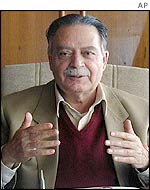
Sardar Sikandar Hayat Khan : (born June 1 1934) was twice a former Prime Minister and President of Azad Jammu and Kashmir. He has been the longest serving Prime Minister of Azad Jammu and Kashmir.
Sardar Sikandar Hayat Khan born into an eminent political family of Kashmir , he is the son of Sardar Fateh Muhammad Khan Karelvi, a name synonymous with one of the first major uprisings against the repressive Dogra regime in 1931. It was Sardar Fateh Muhammad Khan Karelvi, who led the popular agitation against an arbitrary tax on salt imposed by the Maharaja’s regime. Three years later in 1934, running as a candidate for the All Jammu and Kashmir Muslim Conference, he was elected to the Jammu and Kashmir Legislature, the Praja Sabha, from his home constituency of Mendhar-Poonch, an office he successfully held through the elections of 1938 and 1944. In 1948 when he was President of All Jammu and Kashmir Muslim Conference Mendhar, he organised the supply of arms to protect the Poonch and Rajauri area and later, he also served as a member of the State Council during 1969-70. He is remembered today by the Muslims of Azad Jammu and Kashmir as one of the pioneers of the struggle of the people of Jammu and Kashmir for their rights under the tyrannical and alien rule of the Dogras.

Sardar Attique Ahmed Khan also known as Sardar Atiq (born January 21, 1955, Ghaziabad, Jammu and Kashmir ia a Pakistani Kashmiri politician and President of the Muslim Conference a political party in AJK. He was elected Prime Minister of Azad Jammu and Kashmir on July 24, 2006.He is the son of Sardar Muhammad Abdul Qayyum Khan, a renowned political, social and intellectual figure, and a grandee of All Jammu and Kashmir Muslim Conference(a political party established in the year 1932 in British India). Sardar Quyyam has served as Prime Minister and President of Azad Government of the State of Jammu and Kashmir. The only other person to have served both the Prime Minster and as the President of the Government of Azad Jammu and Kashmir is Sardar Sikandar Hayat Khan.He holds a Master Degree in International Relations and has studied the Arabic Language at the renowned Islamic University of Madinah of Saudi Arabia.Video
Former Prime Minister Azad Jammu Kashmir during visit to UK
http://www.youtube.com/watch?v=tUisNVrBN3c
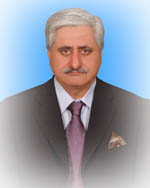
Prime Minister Azad Jammu Kashmir SARDAR MUHAMMAD YAQOOB KHAN
Remained Students Leader in College life, Social Worker, Started political career in early age after college education, Central Office bearer of Punjabi Pakhtoon Athad in Karachi , Senior Vice President Tehreek Amel Party Azad Jammu and Kashmir, contested Election of Provincial Assembly of Sind at Karachi and Azad Jammu and Kashmir Legislative Assembly.
- Established Industry in Karachi and Azad Jammu and Kashmir.
- Very popular leader of his Constituency
- Elected MLA AJ&K Assembly for two terms in the past.
- Remained Minister of Health, Population Planning & Hydro Electric Board, Housing and Planning in 2001-2006 & 2009.
- Introduced far-reaching constitutional changes in all departments of party organization and gave a new political verve to the workers.
- Introduced the idea of Community Participation at grass root level by creating mass political awareness amongst the general public.
- Widely traveled as Industrialist, Member Parliament/ Minister Middle East Europe, Africa, America and China etc.
- Participated in numerous delegation of national and international importance from time to time.
PLEASE WATCH THIS VIDEO http://www.youtube.com/watch?v=CS4Lmx26Yro
 Maqbool Butt, Kashmir’s first dreamer for an independent Kashmir was hanged by India on 11 February 1984. His dream, his prophecy and his legacy still lives on in our hearts.
Maqbool Butt, Kashmir’s first dreamer for an independent Kashmir was hanged by India on 11 February 1984. His dream, his prophecy and his legacy still lives on in our hearts.
Chairman UKPNP
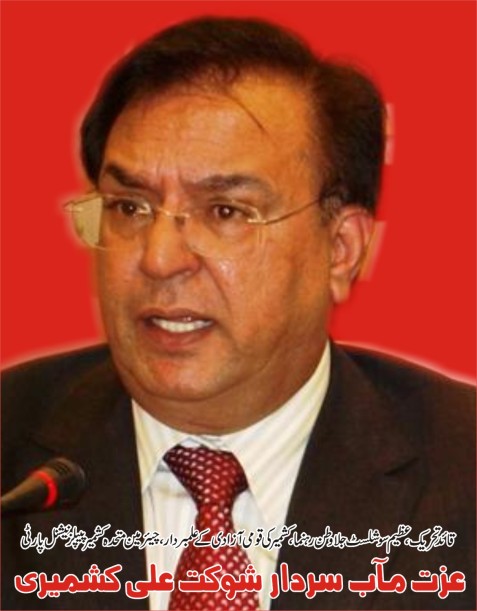 Sardar Shaukat Ali
Sardar Shaukat Ali
Kashmiri Chairman of UKPNP, The great
leadership who is struggling for the rights of the People’s of Kashmir. He is
living in exile in Switzerland since April 25, 1999 after his life was in danger
at the hands of ISI of Pakistan Army. Since 2002, he is Secretary General of
Int’l Kashmir Alliance (IKA), which is comprised of secular political parties
struggling for the independence of Kashmir, Gilgit &
Baltistan.
He was born on 1958 in a
village called Papanar near Trarkhal, Sudhnuti, ‘Azad’ Kashmir. After completed early education from Government High
School, Trarkhal in 1973, he moved to Karachi where he completed his degree in
F.Sc. In 1977 from Government Science College, Nazimabad, Karachi, and then
B.Sc. in 1980 and then Bachelor of Laws in 1982 and Master of Islamiat in 1985
from Karachi University, Pakistan.
During student career at Karachi, he struggled for the
educational and democratic rights of the students and organised many
demonstrations and strikes in order to put administration’s attention on the
matters. He was several times in jail in Pakistan and Pakistani occupied
Kashmir.
During the period from 1985 to 1997 he practised as an
advocate in different courts of ‘Azad’ Kashmir. He is member of many NGOs and
was once elected as general secretary of Bar Association Rawalakot. He was
Secretary General of Sudhan Educational Conference, the oldest and biggest
welfare organization. During the period from 1980 to 1997 he organised seminars
in different cities of ‘Azad’ Kashmir on human rights violations and right of
self-determination of the people of Kashmir, Gilgit & Baltistan and demanded
the exit of Pakistan Army from POK. He organised many demonstrations against
Theo-fascism and Pakistan’s proxy war with India. In 1993, he represented
Kashmiri people in the European Parliament Round Table Conference held in
Brussels, in Belgium
Due
to his strong and effective campaigns and increasing fame in the public, which
was becoming a big threat to the puppet Government officials and other ISI bless
parties for the future; He was abducted by ISI in 1994 and 1998. UKPNP and other
like-minded parties and nationalist groups demonstrated against his illegal
confinement and detention throughout ‘Azad’ Kashmir and Pakistan. In start ISI
and Government of POK denied any involvement in his abduction, but because of
continue pressure from the public and international community; he was released
without charge after 9 months of illegal arrest.
In
1994, he became the founding Chairman of United Kashmir People’s National Party.
. During the period from 1999 to 2004 he delivered speeches during the sessions
of UNHRC and Sub Commission on Human Rights in Geneva, on the subject of human
rights violations and the Kashmiri’s right to self-determination for the
establishment of an independent Kashmir On represented UKPNP in different
international forums. Amnesty International declared him a prisoner of
conscience.
He
is living in exile in Switzerland since April 25, 1999 after his life was in
danger at the hands of Inter-Services Intelligence (ISI) of Pakistan
Army.
Since…2002, he is Secretary General, International
Kashmir Alliance (IKA), which is comprised of secular political parties
struggling for the independence of Kashmir, Gilgit &
Baltistan.
From 2002 to date, he has organised many conferences in
different capitals of European countries.
Chaudhry Abdul Majid

Chaudhry Abdul Majid , elected as Leader of House Legislative Assembly of Azad Jammu and Kashmir on 26th July 2011.
Father’s Name:Ch. Lal Khan
Marital Status: Married
Religion: Islam
Education: B.A L.L.B
Party Affiliation: President Pakistan Peoples Party
POLITICAL HISTORY:
Elected Sixth time as Member Legislative Assembly of Azad Jammu & Kashmir and he has served as Minister for revenue & agriculture Azad Govt. of state of Jammu and kashmir. Served as Speaker Legislative Assembly of Azad Jammu & Kashmir from 1998 to 2001,Opposition leader from 4th Feburary 2011 to 26th July 2011.
Former Prime Ministers of Azad Jammu And Kashmir |
||||||||||||||||||||||||||||||||||||||||||||
|
Raja Shehzad Khursheed Rathore said,
January 16, 2012 at 6:36 am
After reading to the above history of the A.J.K leader, found nothing about Former Prime Minster of Azad Kashmir Mumtaz Hussein Rathore.
Former Prime Minster of Azad Kashmir Mumtaz Hussein Rathore. A very sad moment for me. How could the developers of this site forget to mention the services of Mr. Rathore for Azad Kashmir?
Why they showed so much negligence to this leader. Who was a born leader. A legend of Azad Kashmir?
Raja Shehzad Khursheed Rathore said,
January 16, 2012 at 6:40 am
After reading to the above history of the A.J.K leaders, found nothing about Former Prime Minster of Azad Kashmir Mumtaz Hussain Rathore.
A very sad moment for me. How could the developers of this web site forget to mention the services of Mr. Rathore for Azad Kashmir?
Why they showed so much negligence to this leader. Who was a born leader. A legend of Azad Kashmir?
Raja Shehzad Khursheed Rathore said,
January 16, 2012 at 7:32 am
A question arises in my mind that who are the developers of this site?
We get information about every leader of AJK, but just not about Mumtaz Hussain Rathore. Why?
He passed so many resolutions in AJK assembly, where are those details of his services?
nadeem shoukat said,
July 17, 2013 at 8:48 pm
i am in saudia trarkhl is my city
Omer Hayat Khan said,
December 31, 2013 at 4:23 pm
This is not the fair narration of the political characters / leaders of AJK. What is this K
KZAMAN MEDIA? Only one short paragraph on the founder of AJK, Ghazi e Millat Sardar Ibrahim Khan and so much projection to Abdul Qayum Khan and others is beyond understanding. It has some political designs and motives behind. K H Khurshid, though, leader of good repute and standing had never been democratically elected as the president of AJK. He was nominated during Ayub’s regime. There is no elaboration of Mumtaz Hussain Rathore who was very dynamic and graceful PM of AJK who also had very long and turbulent political career.